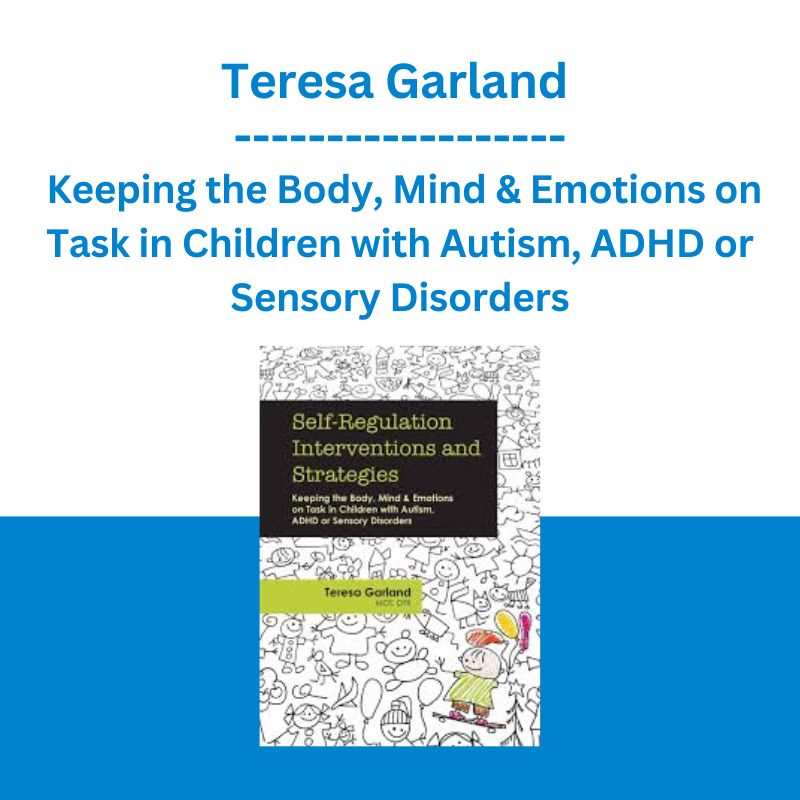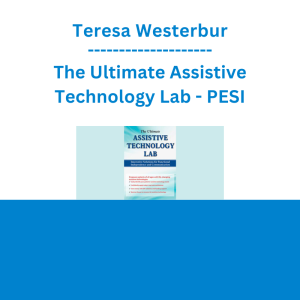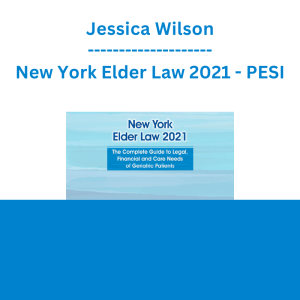*** Proof of Product ***
Exploring the Essential Features of “Teresa Garland – Self-Regulation Strategies for Children: Keeping the Body, Mind & Emotions on Task in Children with Autism, ADHD or Sensory “
Description
- DSM-5® updates for autism and sensory modulation
- Build and enhance self-regulation in any setting
- Come away with:
- Sensory therapy techniques
- Self-management and video modeling programs
- Sensory lifestyle
- First person stories
- Energy regulation techniques
Children who have trouble self-regulating throughout the day are missing out on typical childhood experiences in school, on the playground and with their families. This workshop looks at the underlying factors of poor self-regulation and how they affect the child.
Experienced presenter, Teresa Garland, MOT, OTR/l will teach you practical interventions and how to create simple, but effective programs in clinical, school and home settings:
- Sensory therapy techniques
- Simple self-management and video modeling programs
- Sensory lifestyle
- First person stories
- Energy regulation techniques
- Emotional regulation techniques
- Communication methods
- Transition strategies
- Behavioral strategies
Clinical programs such as Interactive Metronome® and Emotional Freedom Technique (EFT™) will be discussed, as will timely topics such as medication vs. non-medication for ADHD and new insights from research into biomedical aspects of autism. You will receive written handouts and a list of resources.
Speaker
Teresa Garland, MOT, OTR/L
Teresa Garland, MOT, OTR/L, is an occupational therapist and author specializing in sensory and modulation issues. She has worked in schools, sensory clinics and medical settings with children and adults, treating sensory disorders, ADHD and autism. Ms. Garland works closely with other health professionals, teachers and doctors to understand and treat underlying sensory, timing, and coordination/motor planning issues as well as overlying socio/emotional behaviors in the symptoms of autism. She is trained/certified in the SIPT, Interactive Metronome®, Integrated Listening Systems (iLs), Therapeutic Listening, Wilbarger’s Sensory Defensiveness, the Natural Heart Approach, Mindfulness Training, and Food Chaining. Her bestselling books are titled Self-Regulation Interventions and Strategies: Keeping the Body, Mind and Emotions on Task in Children with Autism, ADHD or Sensory Disorders (PESI, 2014) and Hands-on Activities for Children with Autism & Sensory Disorders (PESI, 2016).
Speaker Disclosures:
Financial: Teresa Garland is a presenter with Michigan Job Rehabilitation. She receives a speaking honorarium, book royalties, and recording royalties from PESI, Inc. She has no relevant financial relationships with ineligible organizations.
Non-financial: Teresa Garland has no relevant non-financial relationships.
Target Audience
Occupational Therapists, Occupational Therapy Assistants, Educators, Speech-Language Pathologists, Counselors, Social Workers, Marriage & Family Therapists, Physical Therapists, Physical Therapy Assistants
Objectives
- Summarize characteristics of sensory modulation disorder, ADHD and autism and how they overlap.
- Illustrate specific treatments for SPD that can be duplicated at school or home.
- Describe the ingredients of a sensory lifestyle.
- Tell examples of elements of successful first person stories and transitional activities.
- Describe ADHD interventions to be used with or without meds.
- Apply a simple self-management and video modeling program.
- Describe how clinic-based therapies can reduce symptoms of SPD and ADHD.
Outline
How Self-Regulation Affects a Child’s Physical, Mental and Emotional Wellbeing
- Overlay of systems
- Overlap with sensory modulation disorder, ADHD, autism, giftedness, anxiety and related conditions
Sensory Processing Disorder (SPD)
- Vestibular, proprioceptive, and sensory modulation characteristics
- Strategies for home and school
- Making it right: case studies and videos
- Sensory diet vs. a sensory lifestyle
- The big therapies: Interactive Metronome® (IM), brushing and sensory diets
ADHD Strategies
- Parker’s guidelines for giving meds
- Greenspan’s strategies for avoiding meds
- Cognitive strategies, attention strategies and mindfulness meditation
Self-Management
- As a powerful behavior program for ADHD
- Case study on breaking “stimming” habits
Utilizing Video
- Role play & video modeling
- Teaching functional skills
- Catching child “being good”
- Working with emotions
- Art and music
- Emotional Freedom Technique (EFT)
- Polyvagal Theory and autism
iPad® Apps
- Visual schedules
- Social stories
- Visual timers
Autism Strategies
- Communication strategies that provide control
- Match-and-repeat technique for social engagement
- Dealing with picky eating and poor sleep habits
- Behavioral strategies for eliminating difficult behavior
First Person Stories & Strategies for Smooth Transitions
- Discuss social interactions
- Describe relevant social cues and behaviors
- Examples of transitional activities
Other Approaches
- Alternative therapy
- Qi massage
Calming Strategies
- Music, Me-Moves™
- Deep pressure, Ease™
Please see the full list of alternative group-buy courses available here: https://lunacourse.com/shop/










 Teresa Westerbur - The Ultimate Assistive Technology Lab: Innovative Solutions for Functional Independence and Communication - PESI
Teresa Westerbur - The Ultimate Assistive Technology Lab: Innovative Solutions for Functional Independence and Communication - PESI  Toshko Raychev - Profit System + ITF Assistant
Toshko Raychev - Profit System + ITF Assistant  Jessica Wilson - New York Elder Law 2021: The Complete Guide to Legal, Financial and Care Needs of Geriatric Patients - PESI
Jessica Wilson - New York Elder Law 2021: The Complete Guide to Legal, Financial and Care Needs of Geriatric Patients - PESI  Chris Capre - Advanced Price Action Ongoing Training & Webinars
Chris Capre - Advanced Price Action Ongoing Training & Webinars